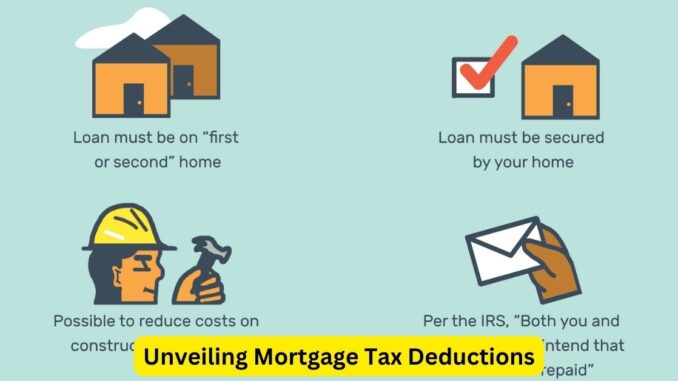
Understanding mortgage tax deductions can significantly impact homeowners’ finances, offering opportunities to save on taxes. Here’s a comprehensive guide to maximizing these benefits:
Mortgage Interest Deduction: The mortgage interest deduction allows homeowners to deduct interest paid on their mortgage from their taxable income, reducing the overall tax burden. This deduction is applicable to mortgages on primary and secondary residences.
Limits and Eligibility: As of recent tax regulations, the deduction is limited to the interest paid on the first $750,000 of a mortgage loan. For loans taken before December 15, 2017, the limit stands at $1 million. To claim this deduction, itemizing deductions on Schedule A of the tax return is necessary.
Home Equity Loan Deductions: Interest on home equity loans or Home Equity Lines of Credit (HELOCs) may also be deductible, but only if the borrowed funds are used to improve the property. Recent changes in tax laws eliminated the deduction for interest on home equity loans used for non-property-related expenses.
Points and Origination Fees: Points, which represent prepaid interest, paid when obtaining a mortgage, are also tax-deductible in the year they were paid. Each point is generally equal to 1% of the loan amount. Origination fees, including loan processing fees and mortgage insurance premiums, may also be partially tax-deductible.
Private Mortgage Insurance (PMI) Deduction: For eligible taxpayers, the PMI deduction allows for the deduction of premiums paid for private mortgage insurance. However, the deduction is subject to income limits and is gradually phased out for higher-income taxpayers.
Strategies to Maximize Deductions:
- Bundle Deductions: Consider timing your mortgage payments to maximize deductions. For instance, paying January’s mortgage in December could allow you to deduct an additional month’s interest in the current tax year.
- Consider Refinancing: Refinancing your mortgage might provide opportunities to deduct additional points or interest paid during the year of refinancing.
- Track Home Improvement Expenses: Keep meticulous records of expenses related to home improvements, as these costs might be deductible if they qualify under the home equity loan deduction.
Consult a Tax Professional: Tax laws are complex and subject to change. Consulting with a qualified tax advisor or accountant can provide personalized guidance on maximizing mortgage-related deductions based on your specific financial situation.
Stay Informed and Organized: Keep all relevant documents, including mortgage statements, loan documents, and receipts for home improvements, organized and easily accessible for tax-filing purposes.
Conclusion: Mortgage-related tax deductions offer valuable opportunities for homeowners to reduce their tax liabilities. By understanding the available deductions, staying informed about changes in tax laws, and strategically planning mortgage-related expenses, homeowners can effectively maximize these benefits and optimize their overall financial strategy.
Leave a Reply